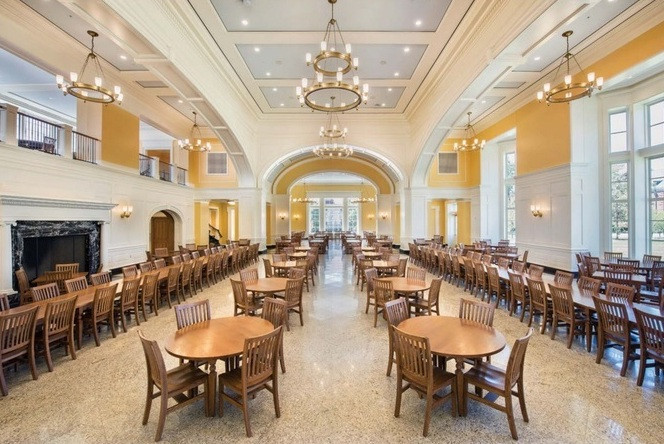
Having been at DePauw for almost two years now, I have learned to expect the unexpected when it comes to our one and only Hoover Dining Hall. From South Asian curries made with turkey at Explore to a whole alligator skeleton at Soulful, Bon Appetit – DePauw’s dining facility provider – definitely keeps things interesting. But while some combinations can indeed be laughed off and join the repertoire of craziest Hoover food medleys to reminisce about in the future with friends, there are certain creations that do not pass the vibe check.
The most recent of these is an addition to the drinks counter, which you may or may not have noticed depending on how frequently you choose to enter Hoover’s hallowed halls—a chilled dispenser of “spa water.” In the past couple of weeks, the spa water has been infused with different fruits and vegetables almost every day, with flavors like “lemon lime,” “orange pineapple” and “blueberry cucumber.” However, quite like the TikTok controversy over the gentrification and appropriation of agua fresca – a popular drink in Latin American countries that has been around since the Aztec Empire – students at DePauw have had concerns about this traditionally Mexican drink being labeled “spa water.”
While literally translating to “fresh water,” agua fresca can also be “more creamy and milky,” explained Nathalia Martinez-Baca ‘26. She brought up the issue of giving credit where credit is due, because while just lime and water isn’t the same as agua fresca, the addition of other fruits and vegetables necessitates recognition of the beverage’s roots and correct nomenclature. Martinez-Baca also acknowledged that a lot of appropriation of multicultural and non-Western food and drink is done to make them digestible, both literally and figuratively, for a Caucasian audience.
Caitlyn Araujo ‘26 shared that she grew up making different kinds of agua fresca with her grandmother, and sees it as a quick and easy drink that has forged connections between her family and cultural heritage. When Araujo initially saw the spa water, she was shocked and thought it was funny. She said it was not unexpected of Hoover since the dining hall has a history of not doing justice to a lot of Mexican food, like the “Taco Tuesday” addition to late night options.
A student employee at Hoover, Daniel Villa ‘26, said that while they don’t entirely do justice to a lot of international dishes, he understands that a college dining hall isn’t necessarily able or even expected to reproduce the authenticity of food in the way a restaurant or home-cooked meal can.
Villa explained that a lot of the seasoning and ingredients come from mainstream brands, which will never be able to replicate the same kind of food in the country it is native to, or even in the bigger metropolitan cities in the U.S.
Students suggested that dishes and their labels could be run by employees with diverse backgrounds in order to ensure cultural sensitivity. Transparent and accessible channels of communication and feedback could further be promoted so that the general student body is able to raise these concerns and allow for reparations to be made. In the end, Hoover is a primary source of nutrition for a lot of students at DePauw, especially first-years, and can be a familiar and comforting place to spend time with family, friends and teammates. By calling out the ways in which it is a little less welcoming and working toward change, the DePauw community can become a safer and inclusive space for all.
